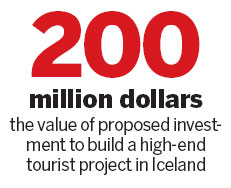

|
A model of Zhongkun Plaza on display at a housing fair in Beijing. The Icelandic government for the second time has rejected Zhongkun Investment Group Co's bid to purchase a plot of land to build a resort in the European country. Wu Changqing / For China Daily |
Huang Nubo, chairman of Beijing-based Zhongkun Investment Group, is planning to protest directly to the Icelandic government after it ordered him to reapply for permission to go ahead with a major tourist project on the northeast coast of the island.
Huang said: "I feel I have been disrespected and deceived, as the owner of a private Chinese company trying to invest in Iceland."
Huang said he suspected the decision had been made because of discrimination against Chinese investors, and claimed it had broken World Trade Organization rules.
But he added he will not be withdrawing his plans, and expected Icelandic officials to give him a clear and final decision on the project's future as soon as possible.
Architect Halldor Johannsson, Huang's representative in Iceland, told China Daily that he was still optimistic about the future of the deal, adding "we are working professionally, and it's a learning process for both sides".
Huang was first invited to invest by local landowners in Iceland in August 2011, and proposed a $200 million deal to build a high-end tourist project in the country's northeast, which involved buying 300 square kilometers of land.
The deal was first rejected by the Icelandic interior minister in November 2011, despite the possible creating of 400 to 600 jobs.
In May 2012, talks were resumed with Huang by offering him and his company the possibility of leasing the land instead of buying it.

Huang accepted the offer, and announced in October that he got details of the draft contract and both sides were planning for a signing ceremony in Beijing.
On Sunday, however, Huang learned that the Icelandic government had asked his Iceland-registered firm Zhongkun Grimsstadir to submit a new application that would be reviewed once again by a government committee.
"It came as an embarrassing shock that they were still unable to make a final decision on the application as much information remained unavailable," Huang told China Daily.
Some local commentators have been raising questions about how the project compromises regional security because of Iceland's strategic location in the Atlantic, where several nations are competing for resources.
"I don't understand why they bring up terms like regional security and strategic location again," Huang added.
"I've offered them everything they need to know," he said. "So it sounds to me like they are making excuses."
He now plans to protest direct to the Icelandic government, but said he feels there has been a lack of friendly, professional respect during the whole process.
"The investment environment has not been fully open. I deserve a clear answer, without any more postponing."
Huang and officials from his company said they had experienced much clearer and more transparent approaches in all the other countries in which they had invested, including the United States.
The investment group's Vice-President Xu Hong added: "We follow clear principles and have seen transparency with all our projects in the US.
"But in Iceland, the process has been complicated with politics."
Bao Yujun, president of All-China Private Enterprise Federation, told Xinhua News Agency that the case illustrated just how many Western economies are still suspicious of Chinese enterprises investing overseas, and that the security excuses sounded made-up.
Halldor Johannsson agreed. "I'm disappointed. It's a matter of local politics. There are certain people here who still consider business proposals as political decisions."
He added that other foreign investors had had projects approved by the Icelandic government, at the same time as Zhongkun was applying.
But he suggested Huang should not to take the setback personally.
He said that it was the first time the Icelandic government had received a project application from a private Chinese company, and a committee had been set up to deal with it. The matter had also become complicated by "the size of the land concerned".
"There are misconceptions on Chinese firms, and unluckily Zhongkun has to challenge these old ideas. Mutual understanding is needed, which takes time," he said.
Johannsson said he was confident of a positive outcome because of the generally positive attitude toward Chinese investors.
"I get phone calls everyday from Icelanders asking about inviting Chinese firms to invest," he said.
meijia@chinadaily.com.cn
(China Daily 12/05/2012 page13)